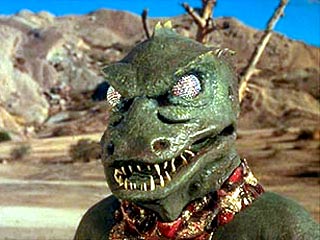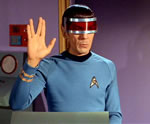18. Arena.  Arena asks you to reflect on your feelings about vengeance. Arena asks what justice is worth. Arena asks if you’re a proponent of ironic punishments. Arena asks if you will continue to watch, and genuinely like, an old TV show that features a creature with a truly ridiculous mask, costume, and roar. Arena asks, “Who would win in a fight between a really strong thing that’s super slow, and a relatively weak thing that’s much faster?” Arena asks if you can recognize white powders merely by glancing at them on a monitor. Arena asks if you know the chemical composition of gunpowder. But mostly, Arena is a test of whether or not you will like classic Trek. Universally accessible themes and iconic characters BUT a reliance on special effects that are cheesy but still highlighted as though they are not, highly questionable science (but at least an attempt at it), and lots of fightin’/scrappin’. This is what Trek IS. You like all of those things unironically or you do not like the show.
Arena asks you to reflect on your feelings about vengeance. Arena asks what justice is worth. Arena asks if you’re a proponent of ironic punishments. Arena asks if you will continue to watch, and genuinely like, an old TV show that features a creature with a truly ridiculous mask, costume, and roar. Arena asks, “Who would win in a fight between a really strong thing that’s super slow, and a relatively weak thing that’s much faster?” Arena asks if you can recognize white powders merely by glancing at them on a monitor. Arena asks if you know the chemical composition of gunpowder. But mostly, Arena is a test of whether or not you will like classic Trek. Universally accessible themes and iconic characters BUT a reliance on special effects that are cheesy but still highlighted as though they are not, highly questionable science (but at least an attempt at it), and lots of fightin’/scrappin’. This is what Trek IS. You like all of those things unironically or you do not like the show.
Me, I LOVE Arena. To me, it’s one of the Three Classic Iconic Episodes of the show, with Amok Time and The Trouble With Tribbles. But I know it’s got some problems. The Gorn is really laughable. The puzzle element to it is terrific, but the “clues” for it are pointless.
My main question about Arena is: does it belong in the category of things that you cannot begin to like as an adult? You either experience them growing up, and earn a soft spot for them, or you don’t, and by the time you’re old you’re not going to be able to appreciate them. I think Monty Python and the Holy Grail and video games are things like this. I suspect Arena is, too.
Killer Spock line: none. But I love when he’s watching Kirk’s battle on the monitor and sees the scattering of white powder, and instantly knows how to win the fight. What? I don’t know a lot about chemistry, but I know there are an awful lot of things that come in the form of white powder. Plus we better gloss over that if everything was a test of ingenuity, Vulcans would completely destroy humanity. Overall: 5 out of 5.
Trek tropes:
- Anonymous redshirt killed
19. Tomorrow is Yesterday. A memorable time travel-story, and pretty fun, but chock full of logical flaws that derail it. Classic Trek has a way of doing stuff like this that drives me crazy. They acknowledge the moral dilemmas and spend lots of dramatic time debating things, then go right ahead and mess everything up anyway. See: every episode that deals with the prime directive. Also see: this episode, and any discussion related to not letting the 20th-century dudes know about their futures. For instance, Spock, after venting all kinds of concerns about letting Capt. Christopher know anything about the future, goes ahead and lets him know they need to get him back to Earth because he’ll be having a son down the road. Kirk & Co. realize it’d be better to just keep the next guy they accidentally beam up in the transporter room. Eventually they realize they can just Vulcan neck pinch everyone and save themselves a lot of hassle. I don’t even want to get into the crazy getting-back-to-the-present physics. But then again, they have laid the groundwork for how easy it is to accidentally time travel if you have a starship. Killer Spock line–McCoy: “Shouldn’t you be working on your time warp calculations, Mr. Spock?” Spock (apparently just standing around): “I am.” Overall: 3 out of 5.
Trek tropes:
- Recent Earth history will always be relevant
- In the future, computers are magic, but still make teletype sounds
- Highly experimental plan with low probability of success somehow works anyway
- Lighthearted banter to close episode
20. Court Martial. A very strong entry for Trek: unusually tightly plotted, and a good character piece for most of the principals. Mostly I just have notes for this one.
Fun stuff:
- The Lawyer (Elisha Cook) is awesome. He goes on this great rant about how great books are, because it’s the only way you can really find anything and computers are terrible. His skill at digging the context and meaning out of books has made him the lawyer he is. I couldn’t agree more*.
- Kirk has a Starfleet Citation for Conspicuous Gallantry. That is just the best.
- I like how Spock proves the computer is malfunctioning by defeating it multiple times at space chess. (There’s an editing snafu there, for fun, or which contributes to his victory–he makes two moves in a row.)
- Uhura takes over piloting the ship during an emergency. This is a pretty huge deal, and it’s too bad they don’t do more with this. I mean, if she’s capable of piloting the ship, that implies that her position as communications officer is a choice, right? All too often they portray Sulu or Spock as being mega awesome and Uhura as a glorified secretary, so this was good to see.
Weird stuff:
- Everyone’s really upset about the death of some crewman, which is odd because a redshirt dies in like every episode.
- Kirk has a special button on his Captain’s chair, right where his hand rests, specifically for jettisoning an important pod. Don’t accidentally hit the “jettison pod” button that’s located right at your fingertips! It will lead to a court martial! And sure enough, it sure does cause him some trouble! (This should be the plot for a Red Dwarf episode rather than Trek, I think.)
- Kirk boasts that the computer can boost audio by “One to the fourth power.” One to the fourth power is, uh, one, Mr. Conspicuous Gallantry.
- Finney is supposedly Kirk’s classmate but is like 20 years older than Kirk.
I particularly like the Killer Spock Line this time around because they still haven’t established whether Spock is a “Vulcan” or a “Vulcanian”: “I am half Vulcanian. Vulcanians do not speculate. I speak from pure logic. If I let go of a hammer on a planet that has a positive gravity, I need not see it fall to know that it has in fact fallen.” Overall: 4 out of 5.
Trek tropes:
- Anonymous redshirt killed
- Kirk meets up with an old flame
- In the future, computers are magic, but still make teletype sounds
- Enemy allowed easy access to highly sensitive area of the ship
- Even in interstellar space, the best way to resolve problems is with your fists
- Lighthearted banter to close episode
21. The Return of the Archons.
I briefly got K to watch Trek with me a few years ago, but she inevitably fell asleep whenever we watched. (60s TV pacing: she is no fan.) I have fallen asleep to my share of these, but “The Return of the Archons” did the trick quicker than usual. All I remember is that the crew runs around this Earth-like place just about forever trying to get a meeting with the alien leader. I was sort of dreading getting back to this episode, knowing it was pretty boring. So I’m not going to bother, and I’m moving on. Deal with it, Return of the Archons.
*Maybe relevant: I’m a professional librarian.
